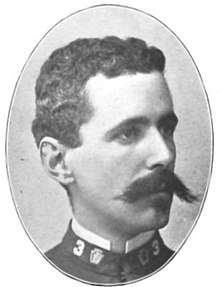Edward de Veaux Morrell
Edward de Veaux Morrell (August 7, 1863 – September 1, 1917) was a Republican member of the U.S. House of Representatives from Pennsylvania.
Edward de Veaux Morrell | |
|---|---|
 | |
| Member of the U.S. House of Representatives from Pennsylvania's 5th district | |
| In office November 6, 1900 – March 3, 1907 | |
| Preceded by | Alfred C. Harmer |
| Succeeded by | William W. Foulkrod |
| Personal details | |
| Born | August 7, 1863 Newport, Rhode Island, U.S. |
| Died | September 1, 1917 (aged 54) Colorado Springs, Colorado, U.S. |
| Political party | Republican |
| Spouse(s) | Louise Bouvier Drexel
( m. 1889; |
| Alma mater | University of Pennsylvania University of Pennsylvania Law School |
Early life
Morrell was born in Newport, Rhode Island on August 7, 1863. He was the son of Edward Morrell and Ida Alicia (née Powel) Morrell.[1]
He attended private schools and graduated from the University of Pennsylvania, where he was a member of St. Anthony Hall, in 1885. He studied law at the University of Pennsylvania Law School, was admitted to the bar in 1887 and commenced practice in Philadelphia. He was a member of the select council of Philadelphia from 1891 to 1894. He was active in the Pennsylvania National Guard, serving as a colonel of the Third Regiment and brigadier general commanding the First Brigade.[2]
Career
Morrell was elected as a Republican to the Fifty-sixth Congress to fill the vacancy caused by the death of Alfred C. Harmer. He was reelected to the Fifty-seventh, Fifty-eighth, and Fifty-ninth Congresses. He served as chairman of the House United States House Committee on the Militia during the Fifty-eighth and Fifty-ninth Congresses. In 1904, he delivered a speech defending the Fourteenth and Fifteenth Amendment from Democrats' polemics against it.[3] He was not a candidate for renomination in 1906.[2]
He established the first telephone line north of the Frankford section of Philadelphia, and built an electric-light plant there. He was a member of the board of education of Philadelphia from 1912 to 1916.[2]
Personal life
In 1889, he was married to Louise Bouvier Drexel (1863 –1945), daughter of Francis Anthony Drexel and niece of Anthony J. Drexel, the most influential financier in the U.S. in the nineteenth century. Louise's mother, Emma Bouvier, is related to the family of Jacqueline Lee Bouvier Kennedy Onassis. Louise's half-sister was canonized as Saint Katharine Drexel on October 1, 2000 by Pope John Paul II.
He was a resident of the Torresdale section of Philadelphia. He later went to Colorado Springs, Colorado, for his health, and died there in 1917. He interred in the family crypt at Eden Hall in Torresdale.[2]
References
- Society, Sons of the Revolution Pennsylvania (1918). Proceedings of the Pennsylvania Society, Sons of the Revolution. The Society. pp. 41-42. Retrieved 20 May 2019.
- "MORRELL, Edward de Veaux - Biographical Information". bioguide.congress.gov. Biographical Directory of the United States Congress. Retrieved 20 May 2019.
- Morrell, Edward de Veaux (April 4, 1904). Negro Suffrage. Should the fourteenth and fifteen amendments be repealed? Speech of Hon. Edward De V. Morrell, of Pennsylvania, in the House of Representatives, Monday April 4, 1904 (PDF). Washington, D.C. Archived from the original (PDF) on July 31, 2018. Retrieved 20 May 2019.
Further reading
- United States Congress. "Edward de Veaux Morrell (id: M000965)". Biographical Directory of the United States Congress.
- Edward Morrell at The Political Graveyard
- Edward de Veaux Morrell at Find a Grave
External links
| Wikiquote has quotations related to: Edward de Veaux Morrell |
| U.S. House of Representatives | ||
|---|---|---|
| Preceded by Alfred C. Harmer |
Member of the U.S. House of Representatives from Pennsylvania's 5th congressional district 1900–1907 |
Succeeded by William W. Foulkrod |